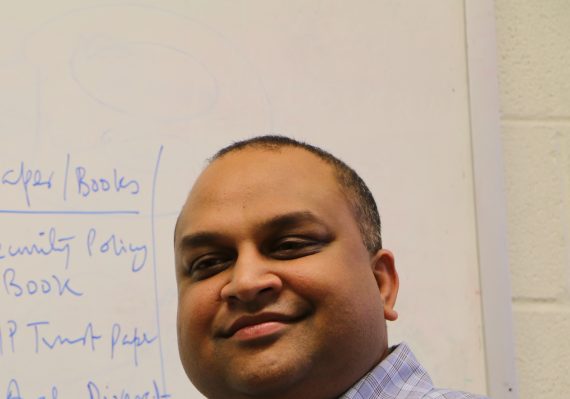Sandip Ray joined the department of Electrical and Computer Engineering at the beginning of 2018, as an endowed IoT (Internet of Things) Term Professor. He is also part of the core faculty of the Warren B. Nelms Institute for the Connected World, commonly referred to as the IOT Institute. With interests as broad and wide as his smile, Dr. Ray brings a wealth of experience, from both the private sector and academia. Previous to joining ECE Florida, Ray was senior principal engineer at NXP Semiconductors, and previous to that role, he served as a research scientist at Strategic CAD Labs at Intel. His prior roles were in academia, as research scientist at the Center for Information Assurance and Security, Department of Computer Science, University of Texas at Austin, where he received his Ph.D in December 2005.
Dr. Ray notes that while his degrees are all in computer science, his professional career focused entirely on computer engineering. In fact, it could be said that a common thread running through Dr. Ray’s career is inhabiting the space in between seemingly disparate principles.
Theory & Practice
“During my Ph.D., my interest was on defining logic and mathematical theories to mathematically prove programs and designs correct. I was primarily interested in theoretical aspects, like expressive power of logics, computational lower bounds, etc. My move towards practice started when I visited IBM and then AMD to apply some of this theory to practice, and I got to see first-hand the deep divide between theory and practice (in practice, of course — in theory there is no divide). However, my computer science foundation has often guided me even in these areas, e.g., I used techniques from compilers and operating systems in reasoning about logic synthesis.”
Validation & Security
“During my experience with post-silicon validation, I learned that (many of) the validators hated security folks. The reason is that for reasons of security, many internal signals of the design could not be observed externally during system execution, making it difficult for the validator to validate the design. This led me to investigate some of the trade-offs between security and debug. Some of my observations were published in a DAC 2015 article “Correctness and Security at Odds”. Anyhow, it is through this rather tortuous route that I got into the area of hardware security. “
Industry & Academia
“I found in particular that developing a comprehensive research program for next-generation automotive and IoT systems is beyond what one can do in industry. Mind, industry has some big advantages and collaboration with industry is critical to success in such research. However, my eventual conclusion was that academia is best suited to lead the research in this area, with various industries collaborating on their respective pieces of interest. This conclusion let me to get serious about coming to academia.”
The Natural World, Etc.
One area where Dr. Ray doesn’t need to reconcile opposing forces: his love for the natural world.
“I come from the city of Kolkata in India, which is close to the Bay of Bengal in the east side of India. I don’t want to bore you with Kolkata — you can find everything you want about it on the Web. However, I want to point out one thing. The Sundarbans, near Kolkata, are the largest mangrove forest in the world. And the second largest? Everglades in Florida. In fact I fell in love with Florida in 2007 on my visit to Everglades National Park, where I had the best ride through the swamps and mangroves, and maybe saw the best sunset of my life.”
“In my spare time (if I can find it!) I love to go on long drives. One particular interest of myself and my wife is to visit the various National Parks of United States. Although Yosemite, Yellowstone, etc. are good, I like the somewhat less trodden parks, like Glacier Park in Montana. One of my favorites is the Redwood park (which is not that less trodden, although certainly less than the big ones.).”
“My other interests are cooking, eating (exploring various cuisines if I want to say this politely), reading, art (particularly surrealism and Escher).”
